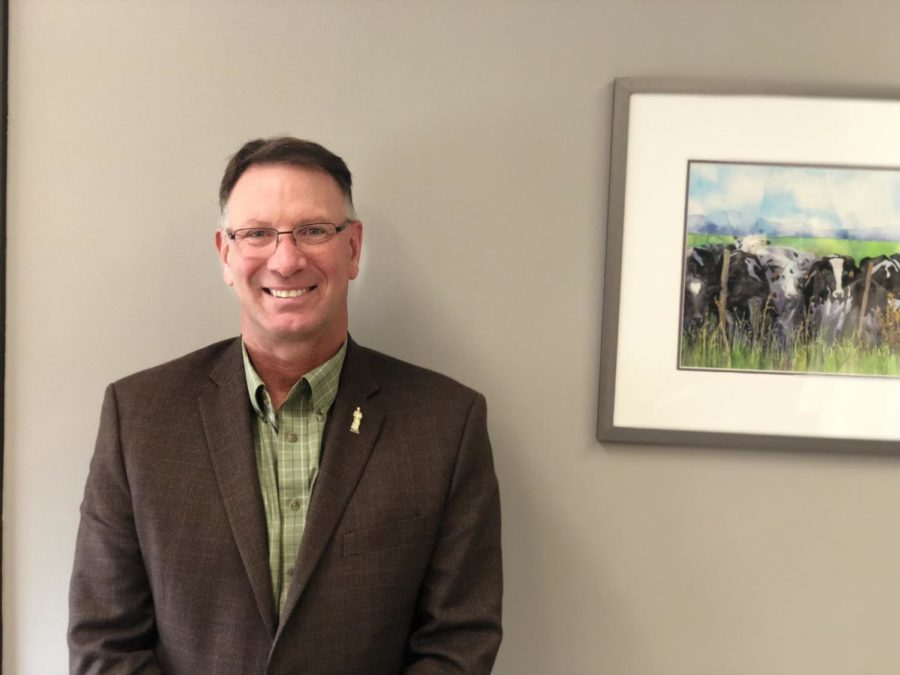Dean of veterinary medicine reflects on progress in department
Dan Grooms is in his second year as Dr. Stephen G. Juelsgaard dean of Veterinary Medicine at Iowa State.
September 22, 2019
Dean Dan Grooms has just started his second academic school year as Iowa State’s Dr. Stephen G. Juelsgaard Dean of Veterinary Medicine after being named to the position in October 2018.
Grooms reflected on the progress made in the College of Veterinary Medicine’s academics, facilities, student life and diversity.
In January 2019 the College of Veterinary Medicine opened its first stereotactic radiation therapy lab. The therapy lab works to provide precise, targeted radiation therapy to help pets with cancerous tumors.
Grooms said with the technology of stereotactic radiation therapy, technicians can focus the radiation beam and make it specific to the tumor.
Stereotactic radiation therapy equipment works to create a radiation beam that fits to the exact size of the tumor, making it less likely to destroy the tissues around the tumor. This prevents unaffected nearby tissue from being harmed by the treatment process.
“It cuts down side effects from radiation therapy,” Grooms said. “You get a much better response, so it takes less time to shrink the tumor down.”
This in turn leads to clients of the school needing to take less trips to Iowa State for animal treatment.
“We have patients from all over the Midwest coming for treatments of specific types of tumors that respond well to radiation therapy,” Grooms said. “We’ve had dogs [and] cats; we’ve had a rat […] There are patients going through there every week.”
The College of Veterinary Medicine is also in the design phase of a new veterinary diagnostic lab, a $75 million project that has been in the works for over a year. Grooms said he hopes to move dirt in the fall of 2020.
Another goal of Grooms’ is to improve the mental and physical well being of students and faculty. Grooms said suicide rates have been high among veterinarians, and he plans to implement programs to create healthy opportunities across the college.
“We have full time mental health counselors here now for our students,” Grooms said. “We have an exercise room where we have treadmills, ellipticals [and] a weight room.”
The College of Veterinary Medicine has also established a wellness room called “The Hideaway.” The room includes couches and chairs where students are not expected to study but rather relax, socialize and destress from classwork.
The College of Veterinary Medicine instituted the Student Duty Hours Policy for all fourth year students in May. The policy affects students as they begin clinical trials by limiting how many hours students are permitted to work without a break. It also requires students to have at least one day away from work for every six days in clinicals.
Grooms said overworking students is not good for their learning or the safety of patients.
“Sometimes kids were here 24 hours, they’d go home, get an hour of sleep and be back in the clinics.” Grooms said. “That’s not good for their health, physical or mental.”
The goal of the Student Duty Hours Policy is to establish positive habits that students will continue to use long after they graduate.
Grooms also plans to increase diversity and inclusivity in veterinary medicine starting with the facilities and student body at Iowa State.
Recent locker room renovations have increased space for women students. Grooms said the veterinary field was male dominated, but now 80% of people enrolled in the College of Veterinary Medicine are women.
Iowa State’s College of Veterinary Medicine has also brought in a consultant of diversity inclusion to provide ideas and feedback on improving the inclusivity within veterinary medicine as a whole.
The Underrepresented Veterinary Medicine Internship Program works to include students from different races, genders, sexual orientations and economic backgrounds by providing them with the opportunity to work in veterinary and food science labs here at Iowa State.
“It’s a program where it’s targeting Iowa State Students right now from underrepresented groups that want to go to veterinary school, and they spend the whole summer here in the college working in a clinic, or we also get them experience with food animals out on the university farms,” Grooms said. “But it’s just exposing them and giving them these great experiences in veterinary medicine, and then they can use those experiences then to make them more attractive as an applicant too, whether it’s to Iowa State or any veterinary school.”
On a more personal note, Grooms said one of the best things from his first year as dean was how welcoming everyone was, including students, faculty, staff and alumni.
“One of the best things about what’s happened last year is just how welcoming everybody has been,” Grooms said. “I’m talking about just friends of the college […] people that are associated because they bring patients here or pig producers, and they depend on our diagnostic lab because of their continuity of business. Just everybody has been really welcoming. That’s been awesome.”







